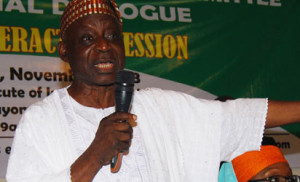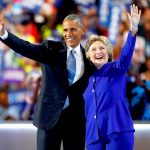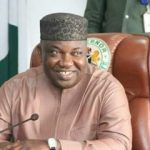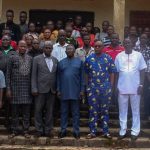Just Before The National Conference Begins
Articles/Opinion, National Conference 2014 Saturday, February 15th, 2014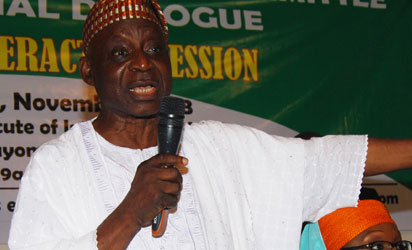
By Adewale Kupoluyi
Since President Goodluck Jonathan announced the plan to convene a National Dialogue during his last Independence Anniversary address, many Nigerians have been apprehensive on what is likely to be the outcome of the exercise that has been engulfed with so-much controversy due to a crisis of leadership and trust.
While receiving the 4,000-page report of the Senator Femi Okurounmu-led Presidential Advisory Committee, President Jonathan had promised that the conference would actually hold early this year. Most people were, however, cut aback when the Secretary to the Government of the Federation, Anyim Pius Anyim announced modalities for the 492-delegate conference, which fuelled the peoples’ fears that its outcome may not really reflect the yearnings of Nigerians because of the disparity between what the committee had recommended and the approved guidelines.
Senator Okurounmu’s committee’s 38-item agenda had recommended that the conference should have no ‘no-go area’, it’s to be managed by 13-member secretariat under an Executive Secretary with two members from each geo-political zone, majority of delegates to be elected directly on the principles of universal adult suffrage, each senatorial zone is to send four elected delegates, each state government is to nominate one delegate, Federal Capital Territory is to nominate one delegate, the President is to nominate delegates for key interest groups, nominated delegates are not to exceed one-third of total number of delegates, conference is to hold for at least three months and not more than six months. The committee also proposed that the conference should hold between February and July 2014, President should send a bill to the National Assembly for an enabling law, or alternatively, the President can convene conference via provisions of Section 5 of 1999 Constitution, while the emergence of delegates is to be based on any of four options.
In the final template released, the Federal Government will now nominate 20 delegates of at least six women, while state governors and the FCT administration will nominate 109 delegates, three from each state and one from FCT. Bodies like the Nigeria Guild of Editors, Nigeria Union of Journalists, Broadcasting Organisation of Nigeria, Nigerian Bar Association, the Judiciary, the Nigerian Society of Engineers, Nigerian Environmental Society, National Youth Council of Nigeria and National Association of Nigerian Students will now nominate members.
Also to have representatives are the National Council of Women Societies, Market Women Associations, the International Federation of Women Lawyers, the National Association of Women Journalists, the Academies of Science, Engineering, Education, Letters and Social Sciences, Civil Society Organisations, Religious Leaders, Nigerians in Diaspora, Political Parties that have representation in the National Assembly and People Living with Disabilities. The Newspaper Proprietors Association of Nigeria, political/cultural and ethnic groups, among others, would also have representatives at the confab.
Other nominations include 37 elder statesmen, one per state and the FCT, by the President. These nominees will also include retired officers of the military, the police and the state security service from each of the nation’s six geopolitical zones. Other delegates will be traditional rulers (two per zone and one for the FCT), retired civil servants (one from each of the zones and the FCT), and representatives of the Nigeria Labour Congress, the Trade Union Congress and Organised Private Sector.
Certainly, the primary purpose of a National Conference is to address and find lasting solutions to the main problems plaguing Nigeria from 1914 to date. These problems border on the quest for the attainment of economic, social, cultural, religious and political justice and equity. Nigerians have tended to live with so much suspicion that having a national collective aspiration seems more Herculean than ethnic and tribal affinity of the over 300 ethnic groups. The nation’s albatross has worsened with the failure of the constitutions, which had never been people-oriented, to redress the fundamental defects. No wonder, Sir Hugh Clifford, Governor-General of Nigeria between 1920 and 1931, once described the nation as a mere “collection of independent Native States, separated from one another by great distances, by differences of history and traditions and by ethnological, racial, tribal, political, social and religious barriers”.
This fragmentation has continued to date. Even on the convocation of the conference, a lot of agitations from many quarters continue to trail representations on primordial lines and if these are not addressed, expectations of the conference may be compromised. The way out is for the various interest groups that feel marginalized to team up to present a common cause. It should be realized that there is no way that the all the delegates can be representative enough to reflect all shades of opinions in a heterogeneous state like Nigeria. What should top on the agenda at the conference are burning issues like the devolution of powers, fiscal federalism, local government autonomy, state police, and according appropriate status for the FCT, institutional corruption and so on. To ensure transparency and participation, the government should ensure that proceedings of the conference are transmitted live at every stage!
On the outcome of the conference, Secretary to the Government of the Federation had noted that it will be by consensus but in the case where a consensus is not achieved, it will be by a 75 per cent majority after which, the conference is to advise the government on the legal framework, procedures and options for integrating its decisions and outcomes into the 1999 Constitution and other laws of the country.
The onus lies on the government to ensure that the delegates discussed under an atmosphere that allows for genuine brainstorming and undue pressure and influence. And more importantly, the outcome should be subjected to a referendum otherwise; the whole exercise would amount to a jamboree, wastage of time and resources, as many pessimists believe. This is against the backdrop of what had become the fate of similar bodies set up in the past. It is instructive to note that Nigerians can never forget so easily, President Jonathan’s pre-emptive stance that the report of the proposed conference would be submitted to the National Assembly for ratification. This ought not to be. We should never fail to recognize that the 1999 Constitution confers sovereignty on the people and, therefore, the best that could happen is for Nigerians to merely cede part of their sovereignty to the members of the National Assembly and not for the legislature to subsume the peoples’ authority.
It is for this single reason of legitimacy that the people have unrepentantly called for a Sovereign National Conference. According to the late human rights activist and Senior Advocate of Nigeria, Chief Gani Fawehinmi; “The primary duty of the Sovereign National Conference is to address and find solutions to the key problems afflicting Nigeria since 1914 to date. The concern is to remove all obstacles which have prevented the country from establishing political justice, economic justice, social justice, cultural justice, religious justice and to construct a new constitutional frame-work in terms of the system of government-structurally, politically economically, socially, culturally and religiously”. This should be the thrust of the confab. This should not be a missed opportunity. Anything short of this may be useless as many skeptics have been telling us. And who knows whether they will be vindicated at the end of the day or not?
Kupoluyi writes from the Federal University of Agriculture, Abeokuta, vide, adewalekupoluyi@yahoo.co.uk, Twitter, @AdewaleKupoluyi
Related Posts
Short URL: https://www.africanexaminer.com/?p=8331


